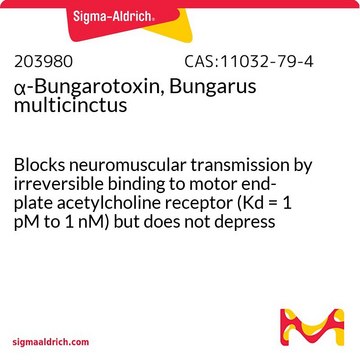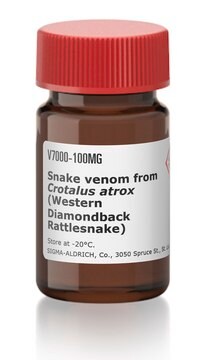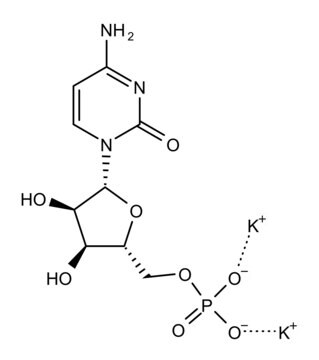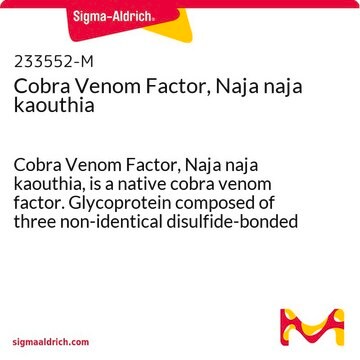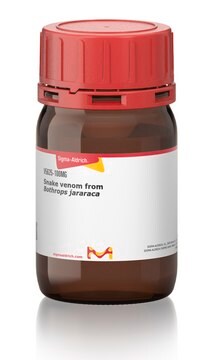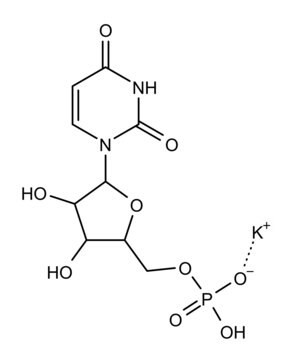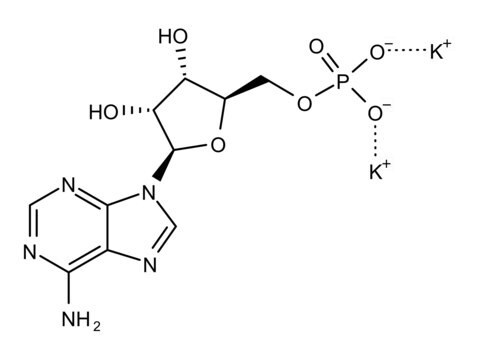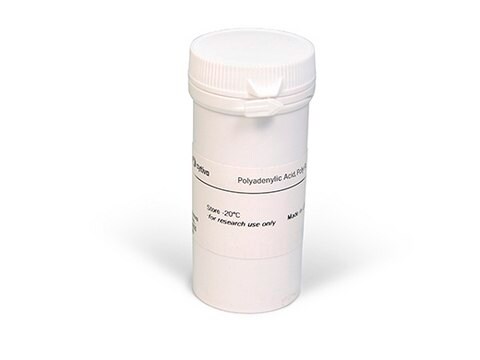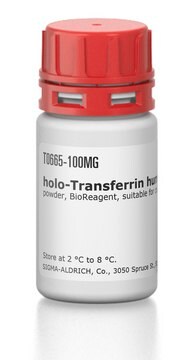T0195
α-Bungarotoxin-tetramethylrhodamine from Bungarus multicinctus (Formosan Banded Krait)
Sinónimos:
TMR-α-BTX
Iniciar sesiónpara Ver la Fijación de precios por contrato y de la organización
About This Item
Productos recomendados
Aplicación
α-Bungarotoxin-tetramethylrhodamine from Bungarus multicinctus was used at a dilution of 1:220 to identify the distribution of nicotinic acetylcholine receptors at neuromuscular junctions of longitudinal sections of rat gastrocnemius muscle.
α-Bungarotoxin-tetramethylrhodamine from Bungarus multicinctus (Formosan Banded Krait) has been used in immunofluorescence staining (1:200) for identification of neuromuscular junction in experimental models. It has also been used to block muscle contraction in myotome cells.
Acciones bioquímicas o fisiológicas
α-Bungarotoxin is a high-affinity antagonist for nicotinic acetylcholine receptors (AChRs) from muscle but not the neurons. Labeling α-Bungarotoxin with tetramethylrhodamine enables the detection of bungarotoxin-binding receptors at neuromuscular junctions.
Useful for detecting the distribution of nicotinic acetylcholine receptors at neuromuscular junctions.
Código de clase de almacenamiento
11 - Combustible Solids
Clase de riesgo para el agua (WGK)
WGK 3
Punto de inflamabilidad (°F)
Not applicable
Punto de inflamabilidad (°C)
Not applicable
Equipo de protección personal
Eyeshields, Gloves, type N95 (US)
Elija entre una de las versiones más recientes:
¿Ya tiene este producto?
Encuentre la documentación para los productos que ha comprado recientemente en la Biblioteca de documentos.
Los clientes también vieron
S Rakhilin et al.
The Journal of cell biology, 146(1), 203-218 (1999-07-14)
Neuronal nicotinic alpha7 subunits assemble into cell-surface complexes that neither function nor bind alpha-bungarotoxin when expressed in tsA201 cells. Functional alpha-bungarotoxin receptors are expressed if the membrane-spanning and cytoplasmic domains of the alpha7 subunit are replaced by the homologous regions
Sara Bachiller et al.
Molecular neurobiology, 55(12), 8856-8868 (2018-04-01)
A missense mutation in HERC1 provokes loss of cerebellar Purkinje cells, tremor, and unstable gait in tambaleante (tbl) mice. Recently, we have shown that before cerebellar degeneration takes place, the tbl mouse suffers from a reduction in the number of
Maxim L Bychkov et al.
Frontiers in cell and developmental biology, 9, 739391-739391 (2021-10-02)
Secreted Ly6/uPAR-related protein 1 (SLURP-1) is a secreted Ly6/uPAR protein that negatively modulates the nicotinic acetylcholine receptor of α7 type (α7-nAChR), participating in control of cancer cell growth. Previously we showed, that a recombinant analogue of human SLURP-1 (rSLURP-1) diminishes
Young-Tae Kim et al.
Biomaterials, 29(21), 3117-3127 (2008-05-02)
Peripheral nerve regeneration across long nerve gaps is clinically challenging. Autografts, the standard of therapy, are limited by availability and other complications. Here, using rigorous anatomical and functional measures, we report that aligned polymer fiber-based constructs present topographical cues that
Paul Hendrickse et al.
Experimental gerontology, 106, 159-164 (2018-03-11)
A large part of age-related muscle wasting is due to incomplete reinnervation of fibres that have become denervated following motoneuron loss. Neural cell adhesion molecule (NCAM) and sodium channel NaV1.5 are considered markers for denervation, but the time course of
Nuestro equipo de científicos tiene experiencia en todas las áreas de investigación: Ciencias de la vida, Ciencia de los materiales, Síntesis química, Cromatografía, Analítica y muchas otras.
Póngase en contacto con el Servicio técnico